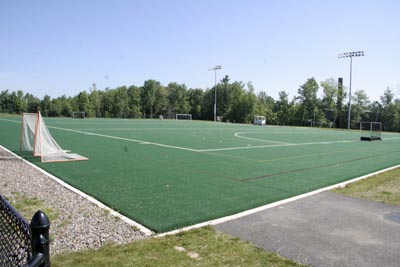Young Athletes at Risk? Is there a link between crumb rubber and cancer?
Concerns are growing faster than the grass that used to cover school athletic fields across the country. That’s because more than 10,000 fields now comprise artificial turf mixed with “crumb rubber” – vulcanized tires spread across swaths of land on which baseball, football, lacrosse, soccer, softball and other sports are played.
An unproven but suspected link between crumb rubber and cancer has elicited a wave of fear and worry among coaches, parents and teachers and prompted a New Jersey community to put the issue in the November 2014 ballot. Voters in Glen Rock rejected plans to construct a crumb-rubber turf at the borough’s Faber Field. Seventy-two percent were in opposition, and 28 percent were in favor.
The crumb-rubber controversy publicly surfaced in October when NBC News released an investigative report about anecdotal health impacts of playing on such turfs. Specifically, the report focused on young soccer goalies with cancer.
Soccer coach Amy Griffin, of Seattle, who is armed with a list of 38 cancer-stricken players, told NBC News 34 of them are goalies. Most have leukemia and lymphoma.
“No research has linked cancer to artificial turf,” the report states. “Griffin collected names through personal experience with sick players, and acknowledges that her list is not a scientific data set. But it’s enough to make her ask whether crumb rubber…is safe for the athletes and kids who play on it.”
School athletes likely will get pieces of crumb rubber in their hair, shoes and uniforms. Athletes who play football and soccer can get the pieces in their ears, eyes, mouths and noses as they dive for the ball, get tackled or wipe out during a game. Those dirty-black grounds also can become lodged in their skin.
It’s no secret tires contain substances such as benzene, carbon and lead, among others. The problem is inadequate studies on any increased health risks from those substances in the context of athletic fields.
The Environmental Protection Agency conducted a limited study that was somewhat inconclusive but identified no increased health risks.
“Given the very limited nature of this study (i.e., limited number of components monitored, samples sites, and samples taken at each site) and the wide diversity of tire crumb material, it is not possible to extend the results beyond the four study sites or to reach any more comprehensive conclusions without the consideration of additional data,” according to the study.
The sites were in Georgia, Maryland, North Carolina and Ohio.
The Consumer Product Safety Commission also conducted a study, an Analysis and Assessment of Synthetic Turf “Grass Blades,” which stated, “during play, lead-containing residue is transferred to a child’s hands and then a portion of that “handload” is transferred to the mouth during the day. The staff practice for assessing whether exposure to a product would result in excessive lead exposure is to assume that about half of the residue that collects on a child’s hands ends up in their mouths (i.e., transfer efficiency is 50 percent).”
In Ocean City, N.J., crumb-rubber was not on the ballot, but city officials backed off plans to install the synthetic surface at a stadium. High-school officials in Burien, Wash., also backed off similar plans for their new football field.
The Synthetic Turf Council issued an industry response to the NBC News report: “During the past two decades, there have been more than 60 technical studies and reports that review the health effects of crumb rubber as it pertains to toxicities from inhalation, ingestion and dermal contact, as well as cancer. The preponderance of evidence shows no negative health effects associated with crumb rubber in synthetic turf.”
Share This



